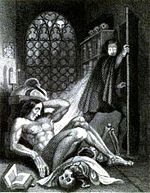Portal:Speculative fiction/Horror

Selected horror profile
Robert Ervin Howard (January 22, 1906 – June 11, 1936) was an American author who wrote pulp fiction in a diverse range of genres. He is regarded as the father of the Sword and Sorcery genre and he created, amongst other characters, Conan the Cimmerian. Howard created Conan the Barbarian, in the pages of the Depression-era pulp magazine Weird Tales, a character whose pop-culture imprint has been compared to such icons as Tarzan, Count Dracula, Sherlock Holmes, and James Bond.
Howard was born and raised in the state of Texas. He spent most of his life in the town of Cross Plains with some time spent in the nearby Brownwood. A bookish and intellectual child, he was also a fan of boxing and spent some time in his late teens bodybuilding, eventually taking up amateur boxing himself. From the age of nine he dreamed of becoming a writer of adventure fiction but did not have real success until he was twenty-three. He was published in a wide selection of magazines, journals and newspapers but his main outlet was the pulp magazine Weird Tales. He was successful in several genres and was on the verge of publishing his first novel when he committed suicide at the age of thirty. Selected horror work
Frankenstein; or, The Modern Prometheus, generally known as Frankenstein, is a novel written by the British author Mary Shelley. Shelley wrote the novel when she was 19 years old. The first edition was published anonymously in London in 1818. Shelley's name appears on the revised third edition, published in 1831. The title of the novel refers to a scientist, Victor Frankenstein, who learns how to create life and creates a being in the likeness of man, but larger than average and more powerful. In popular culture, people have tended to refer to the Creature as "Frankenstein", despite this being the name of the scientist. Frankenstein is a novel infused with some elements of the Gothic novel and the Romantic movement. It was also a warning against the "over-reaching" of modern man and the Industrial Revolution, alluded to in the novel's subtitle, The Modern Prometheus. The story has had an influence across literature and popular culture and spawned a complete genre of horror stories and films. It is arguably considered the first fully realized science fiction novel.
Horror topics
|



